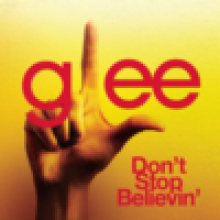Whether it’s my age (transcendence into true unconventional adulthood rather than a post-adolescent surly nonconformist) or the transformation of modern television, I’m not sure, but I’m now a giant fan of Glee. Call me a Gleek and wrap me up in a Journey sheet music sheet—I watched six episodes last night (to my horror, chagrin, and sleepiness) and nearly kept watching them well into the dawn, except that my eyes kept shutting themselves.
Okay, I was also scared, because I’ve recently become addicted to another TV show—Supernatural—that my best friend got me watching. Though I’d watched the episode days before, I still had trouble sleeping—so why not watch Glee instead?
The show is fabulous. It’s got the singing and music that Americans crave—and I knew most of the songs, which could make me old or contemporary, depending on which episode it was—along with a bit of drama, a ton of comedy, and the always-hilarious Jane Lynch. What I really loved about it was its humanization of teachers. We always look at them like they are gods that can do no wrong when we are children, when they are really just as human as we are—with just as many problems as we have.
Of course, the main reason I love the show is how it handles the people on the bottom rungs of the social ladder—though I would argue that they don’t go far enough. Sure, the outcasts get thrown into the garbage, a port-a-potty, and even doused with drinks, but they’re mostly good looking, which is annoying. Real outcasts have zits and braces and plenty of other differences in the looks department; these outcasts—most of them, anyway—would never have been outcasts in my high school. (Then again, our swing choir, its equivalent, was pretty popular.)
However, I can feel a resonance with each character on the original Glee team—before the cheerleaders join—which is why I think it’s so popular to begin with.
